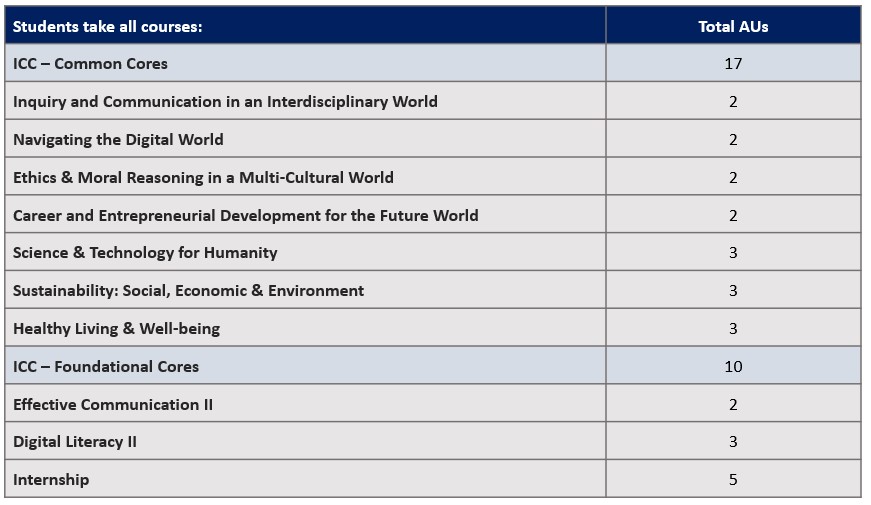The Double Major Programme is a four-year direct honours degree programme. Undergraduate students will read two majors chosen from among the disciplinary strengths of the four schools in the College, namely, the School of Art, Design and Media (ADM), the School of Humanities (SoH), the School of Social Sciences (SSS), and the Wee Kim Wee School of Communication and Information (WKWSCI).
Unlike the existing single discipline-based degrees, this degree will feature two distinct majors within an innovative new structure. As such this is a fully conceived double-disciplinary degree. Each major will have equal weightage. Students will be admitted into this Double Major degree programme at the point of entry to NTU, and declare their two majors at this point.During this four-year degree programme, undergraduates will read both English Literature (ELH) and History (HIST), benefiting from the expertise and resources of the two disciplines from the School of Humanities (SoH).
For English Literature, students will focus both on traditional historical periods and on contemporary innovative approaches to the subject. Specialisations offered include all the major literary periods, Singaporean and Asian literatures, critical and literary theory, cultural studies, film studies, drama, postmodernism, and gender studies.
The History component of the program seeks to train students to not only think critically but also to apply interdisciplinary methods to identify and address contemporary problems from historical perspectives. History graduates will master the secondary literature in their chosen areas of study, engage in independent research, exercise critical judgment about the texts that they encounter, and communicate their findings in a well-reasoned and scholarly manner.
4-Year Direct Honours Programme
This is a four-year direct honours degree programme. If your CGPA is 3.0 and above, your Honours stays with you.
Equal Weightage
Unlike second major, you will receive equal training for both majors.
Degree Scroll
Both majors will be listed on the degree school. You will be recognised for the effort and time spent for the programme
Flexible
You may apply to change your programme after your first year. You must meet the minimum requirement set for your admit year and the acceptance of the new selected programme.
For GCE 'A' level certificate holders:
- NTU General Admission Requirements
- A good grade in General Paper/Knowledge & Inquiry/H1 or H2 Level Humanities subject
For International Baccalaureate Diploma holders:
- NTU General Admission Requirements
- A good grade in SL English
For NUS High School Diploma holders:
- NTU General Admission Requirements
- Good Overall CAP in English Language
For International Students & Students with other qualifications:
- NTU General Admission Requirements
- A good grade in General Paper/English at Senior High School Level
To graduate, students must complete two (2) categories of requirement, totalling at least 138 Academic Units (AUs):

*Students who are eligible to do the FYP will be strongly encouraged to do an inter-major FYP. Students whose GPAs fall in a certain range can choose whether or not to do the FYP. Students who do not do the FYP must clear 8 AUs of PEs (two 4000-level courses, one from each discipline) within the double major.
Interdisciplinary Collaborative Core Courses (ICC):

Broadening and Deepening Electives (BDE):

| I. English Curriculum |
|---|
Core [12 AUs]
HL1001 Introduction to Literature
HL1002 Survey of English Literature I
HL1003 Survey of English Literature II
HL1005 Introduction to Singapore Literature
Major Prescribed Electives [26 AUs]
Choose at least TWO from Category A (including at least one of the following: HL2001, HL2002, HL2003, HL2004). Choose ONE each from Categories B, C, and D and the remaining AUs from any category. (At least THREE courses must be of HL4xxx.)
Note to English Literature Double Majors:
For the remaining 2 courses not specified in the Category requirements, besides courses from Cat A to D, you can choose the following uncategorised courses to count towards your Major Prescribed Electives:
- HL1006 Introduction to American Literature
- HL2024 Approaches to Literature
Category A: Period Studies
(Choose at least two electives)
Click here for
the list of courses under Cat A.
Category B: World
Literatures (Choose at least one elective)
Click here for
the list of courses under Cat B.
Category C: Theory, Culture, and
Film (Choose at least one elective)
Click here for
the list of courses under Cat C.
Category D: Special Interest Areas
(Choose at least one elective)
Click here for
the list of courses under Cat D.
| II. History Curriculum |
|---|
Core [12 AUs]
HH1001 What is History?
HH1002 Asia-Pacific in Global History: Pre-1800 or HH1003 Asia-Pacific in Global History: From 1800
HH2001 Singapore: The Making of a Cosmopolitan City-State
HH3001 Historiography: Theory and Methods
Major Prescribed Electives [26 AUs]
(i) Choose at least 2 courses at HH3XXX, and 3 courses at HH4XXX.
(ii) Choose at least one course from 3 of the 4 categories.
Applied History
Click here for the list of courses under Applied History.
Global Asia
Click here for the list of courses under Global History.
Interdisciplinary History
Click here for the list of courses under Interdisciplinary History.
World History
Click here for the list of courses under World History.
| III. Inter-Major Prescribed Electives |
|---|
8 AUs
Students must clear at least 8 AUs from the Inter-Major Prescribed Electives listed below.
(Note: Courses listed as Inter-Major PEs can be counted as Major PEs)
Inter-Major PE offerings from English:
HL2008 Singapore Literature and Culture (Cat B)
HL2009 Southeast Asian Literature and Culture (Cat B)
HL2021 Literature of Empire (Cat D)
HL2044 Introduction to Publishing (Cat D)
HL3016 Gender and Sexuality Studies (Cat C)
HL3036 History of the Book (Cat D)
HL3040 Gender and Diversity (Cat C)
HL3043 Modernist Soundscapes (Cat D)
HL3045 The Poetry of Precarity (Cat D)
HL4009 Popular Literature and Culture (Cat C)
HL4010 Feminist Studies (Cat C)
HL4013 Advanced Studies in Literature & Culture (Cat D)
HL4037 Writing the Self (Cat D)
HI3001 1984: Past, Present, Prophecy (Cat D)
Inter-Major PE offerings from History:
HH2032 Introduction to Cultural History (Interdisciplinary History)
HH3025 The Cultural, Social and Economic History of Football (World History)
HH3030 The Apocalypse in Western History (Interdisciplinary History)
HH4015 Film: A Global History (Applied History)
HH4027: Propaganda: History, theories and practices (Applied History)
HI3001 1984: Past, Present, Prophecy (Interdisciplinary History)
Graduates in this double major programme will develop key transferable skills highly prized by employers. With their training in the English Literature component of the program, students will be equipped with an outstanding command of the language, and they are skilled in analyzing critical narratives both within and beyond the literary realm. They are trained in all aspects of English literary studies with some comparative and cross-cultural components and features. English graduates can look forward to careers that require analytical skills and strong language proficiency. Along with the History component of the degree, students will also acquire key transferable skills which include research, analysis, and excellent written and verbal communication. Potential job sectors include careers in education, journalism, media and marketing, advertising, publishing, human resources, management, public administration, arts administration, and other creative industries. Graduate will also possess the unique skills to take on positions as public service administrators, language analysts, education and research officers, public campaign organisers.
Other career opportunities include archival work, library and information operations, museum curation and management, policy-making, think-tank research, defence and intelligence research, diplomacy, tourism, and even content development of computer games as potential future career options. Graduates from the programme are also well-positioned to pursue their academic interests at the MA and PhD levels














/enri-thumbnails/careeropportunities1f0caf1c-a12d-479c-be7c-3c04e085c617.tmb-mega-menu.jpg?Culture=en&sfvrsn=d7261e3b_1)

/cradle-thumbnails/research-capabilities1516d0ba63aa44f0b4ee77a8c05263b2.tmb-mega-menu.jpg?Culture=en&sfvrsn=1bc94f8_1)

7e6fdc03-9018-4d08-9a98-8a21acbc37ba.tmb-mega-menu.jpg?Culture=en&sfvrsn=7deaf618_1)


71c552b9-56d0-4df7-a4b1-8ea31da180b9.png?sfvrsn=71e9d4da_3)


